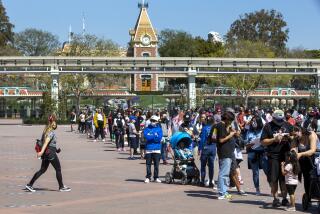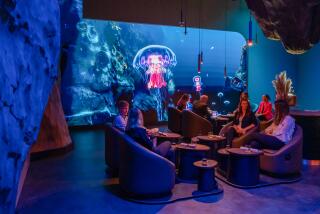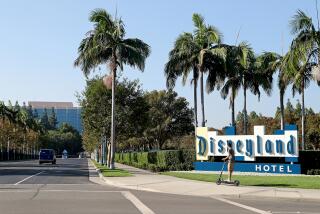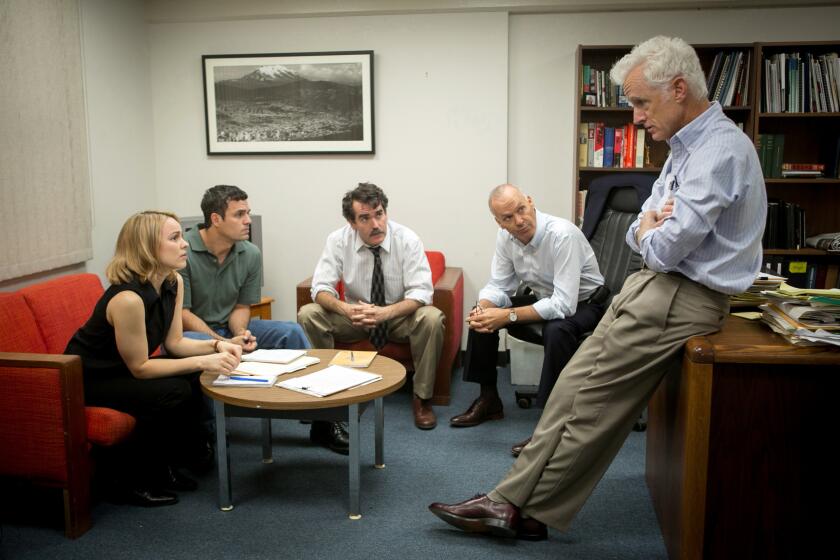Must Reads: Free passes and canoe races: Wages may be low but little-known perks make working at a theme park more attractive
Nine Disneyland custodians who call their team Clean Sweep launched their canoe with a splash.
“One and two and three and,” shouted the stroker, the paddler at the front of the boat, in a race around Tom Sawyer Island. At the back, Melody Anderson wedged her oar into the water, hoping to steer her team to a fast enough time to make the finals.
For the record:
12:30 p.m. Aug. 17, 2018A previous version of this article reported the value of the free passes given to Disney’s most senior workers was as high as $11,840. That figure is the value of 16 passes given to new employees, assuming that the worker brings three guests.
“This perk is very high on my list,” the 61-year-old San Diego resident said of the annual canoe race, held early mornings over several weeks on Disneyland’s Rivers of America. “This kind of thing, being able to access the park, it enhances the job experience.”
Technology companies are famous for delivering extravagant perks to attract and retain talent. Theme parks don’t pay anywhere near as well as tech firms; operating rides, selling souvenirs and the like typically bring only a few dollars over minimum wage.
But little-known benefits — special events, free passes, early access to new attractions — have become a huge part of the compensation package for theme park employees.
Economists say employers offer perks for more than just altruistic reasons: Such extras keep workers loyal, which helps reduce turnover and leads to lower costs for hiring and training new workers.
“It does enable you to hold on to good employees, but it also helps motivate people,” said Chris Tilly, an urban labor economist at UCLA. “You want them to be part of the team, and they are jazzed to be working there.”
What’s more, happy workers usually create a more enjoyable visit for theme park guests, boosting repeat business, he said.
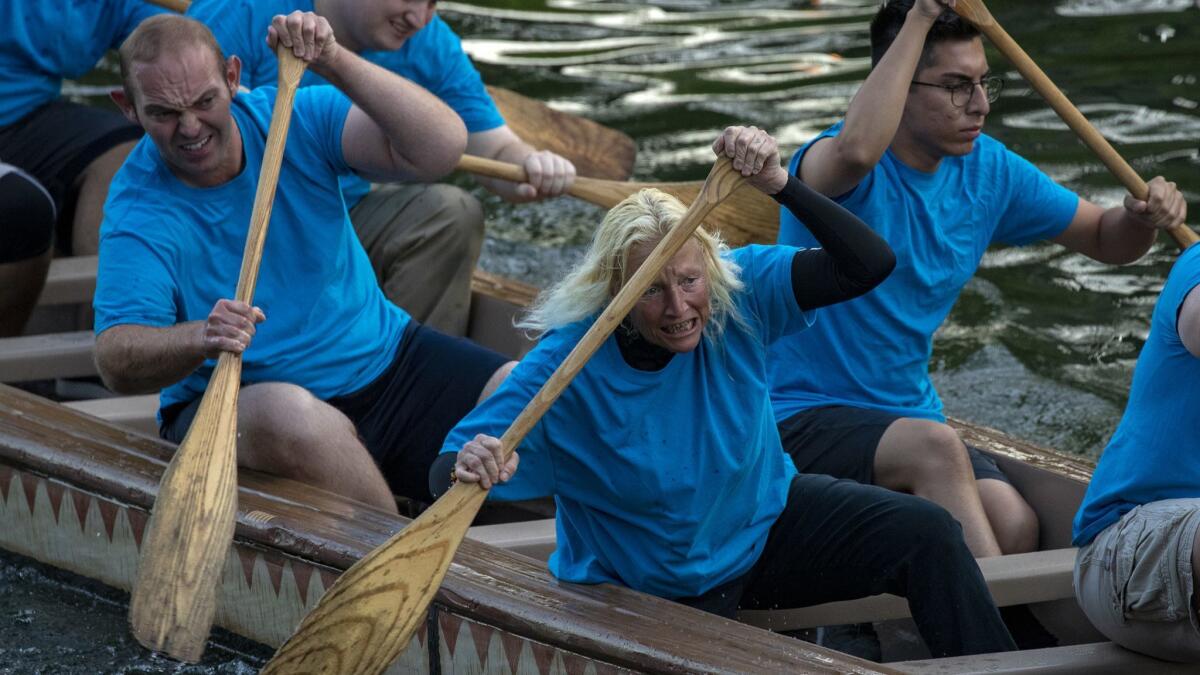
The importance of seemingly frivolous perks was evident during recent contract negotiations at the Disneyland Resort. Among the extras that unions representing 9,700 Disneyland and California Adventure workers were adamant about keeping was an added allotment of park passes to be used during the holidays — a perk the company has offered for years.
“Our members have been used to those perks,” said Denise Anderson, who is in charge of purchasing in the entertainment costuming department at Disneyland. “We wanted to let them know that that is something our cast members work for.”
The contract dispute was resolved last month with pay increases and an agreement that the resort can cut perks for union workers only if the cuts apply to all employees, including managers.
Disneyland representatives confirmed that the so-called Disney Family Holiday Celebration — a time during the holidays when employees get extra park passes — will take place this year but have yet to announce details, such as dates.
More formal employee benefits — such as health and dental coverage, sick leave, paid vacations and retirement plans — amount to about 30% of a worker’s overall compensation package, according to labor experts.
But things such as free park passes and employee parties, theme park workers say, make their jobs more attractive than any other jobs in the hospitality or tourism industries.
“When I was a front-line employee, what kept me coming back were the perks,” said Neal Thurman, president of Six Flags Magic Mountain, who started his career as a ride operator at sister park Six Flags Over Georgia. “They are important.”
At Southern California theme parks, free entrance passes for employees as well as their family and friends are the coin of the realm, with the number alloted varying by park.
Other employee extras include acting classes at Universal Studios Hollywood and special floating movie nights at the wave pool at Six Flags Hurricane Harbor in Valencia. Knott’s Berry Farm in Buena Park gives employees a 20% discount on the park’s famous pies.
In addition to receiving passes for Legoland California, employees of the Carlsbad theme park get free entrance to other attractions owned by Legoland’s parent company, Merlin Entertainments. That includes the Madame Tussauds Hollywood wax museum.
Free passes can be worth thousands of dollars a year, depending on how often they are used and how many passes are given to each worker. The number is usually higher for salaried employees than hourly workers and often increases with each year on the job.
Park passes, which are part of the perks package for all Walt Disney Co. employees, are valued at about $12,000 a year for entry-level workers (who start with 16 tickets and may bring guests) and can be even higher for the most senior, full-time employees, the Burbank entertainment giant estimated.
But free passes come with restrictions. Peak-demand days such as Christmas, New Year’s Eve or the opening day of a new attraction may be blocked to employees wanting to use their passes.
To compensate for the blocked days, most Southern California theme parks schedule a preview event for employees and their families a day or two before a new attraction opens to the public.
“It’s not until you get there that you learn all of the things that this particular job can get you,” said Chris Maul, a tram tour guide at Universal Studios Hollywood.
One of his favorite perks was taking family members to a preview of the park’s $500-million expansion, the Wizarding World of Harry Potter several days before it opened in April 2016.
“It was a huge party,” Maul said. It was a highly coveted add-on, considering that the wait for the Harry Potter rides was several hours during the first few weeks after the new area opened.
Maul also took advantage of a particularly Tinseltown-esque fringe benefit: Universal Studios Hollywood employees can take free acting classes only a stage whisper away from the famous Universal Studios backlot. Employees can attend seminars with entertainment luminaries such as movie director John Landis and television show creator Norman Lear.
The tram guide eventually turned his attention from acting to producing, a goal that got a boost when a guest on one of his tours happened to be the head of television production for Paramount Pictures — who hired Maul as an assistant for a while.
“People like that are on our tours constantly,” said Maul, whose job allows for short leaves to work on his production projects.
At Six Flags Magic Mountain in Valencia, a popular perk is employee summer movie night at the adjoining water park, Hurricane Harbor.
Movies are shown on a screen above the park’s giant wave pool. Employees are allowed to bring up to five guests to float on giant inner tubes as they watch such flicks as “Jaws” and “Black Panther.”
At Disneyland, six teams of canoe-paddling workers wrapped up their one-lap races around Tom Sawyer Island, a distance of less than half a mile. The competition is fierce: Races started at 5:30 a.m. so that workers could get to their shifts later in the day.
With a completion time of four minutes and 49 seconds, Anderson’s team came in second place in the heat, behind the Bad News Baloos, who work on shows and parades in the resort. In the Aug. 9 finals, the Bad News Baloos came in first and Clean Sweep took third, garnering medals and yearlong bragging rights.
“People feel a strong bond after these races,” said Rick Henson, activity events manager at Disneyland Resort, adding that two workers who met during one race season were later married.
Next up: Minnie’s Moonlight Madness, where employees are roped together while they try to complete a scavenger hunt throughout California Adventure Park at night.
The February contest is a favorite for David Atkins, a manager at the Disneyland Resort’s custodial department.
“It’s what separates this,” he said, “from a job at a mall.”
To read more about the travel and tourism industries, follow @hugomartin on Twitter.
